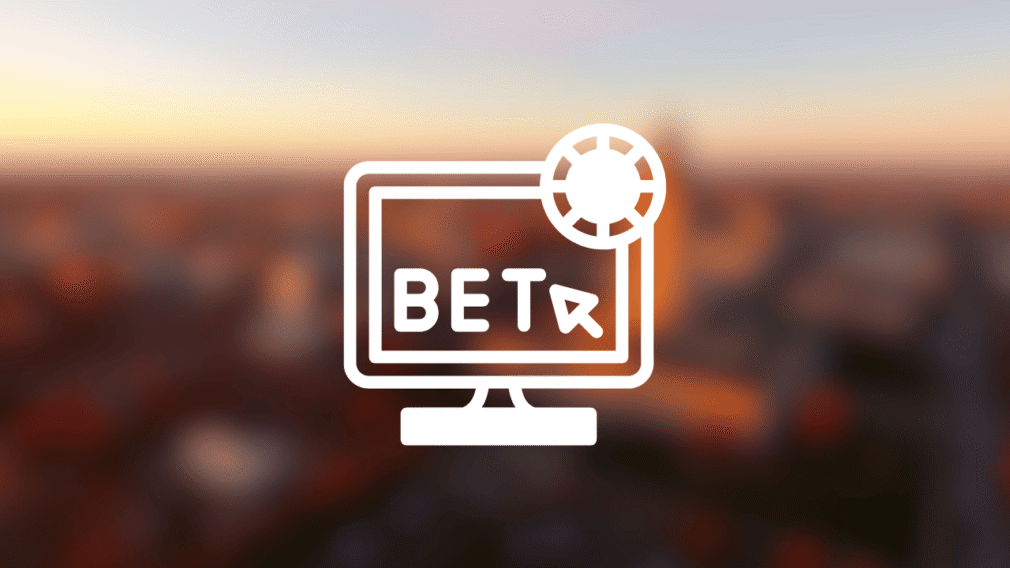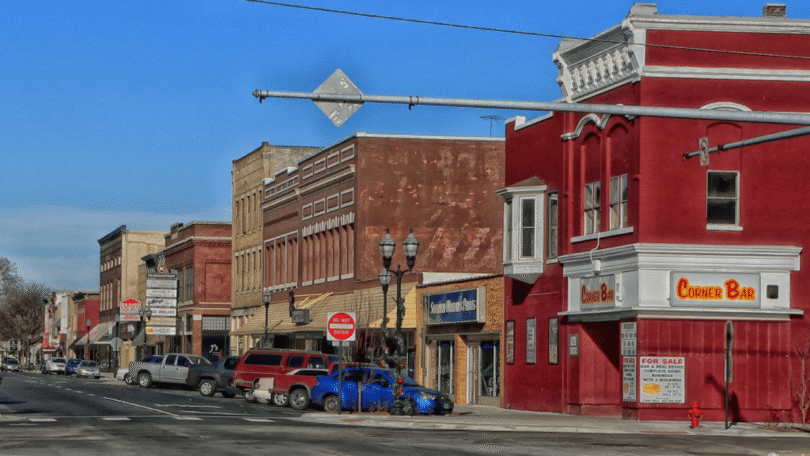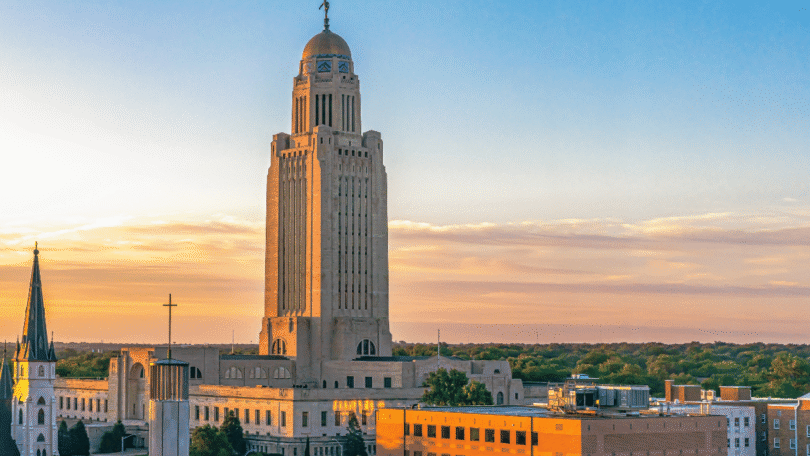Is Sports Betting Legal in Nebraska? Everything You Need to Know
Nebraska’s sports betting market remains confined to in-person wagering at four licensed racinos, with no legal online or mobile betting options, setting it apart from neighboring states like Iowa and Colorado. Legalized in 2021, the market thrives on the passion for the Nebraska Cornhuskers and regional teams like the Kansas City Chiefs, generating a $75 million handle in 2024.

How Nebraska Legalized Sports Betting
Nebraska’s path to legal sports betting began with a conservative gambling history, banning most forms until the 1935 approval of pari-mutuel horse racing.
The 2018 Murphy v. NCAA Supreme Court ruling, which overturned the 1992 PASPA, allowed states to regulate sports betting. In November 2020, Nebraska voters approved Initiatives 429, 430, and 431, amending the state constitution to permit casino gaming and sports betting at licensed racetracks.
On May 27, 2021, Governor Pete Ricketts signed LB 561, legalizing in-person sports betting at racinos. The first bet, a $220 wager on the Cornhuskers, was placed at WarHorse Casino in Lincoln on June 22, 2023.
By 2024, four racinos were operational, with Fonner Park set to open in 2025. Efforts to legalize online betting, including LR3CA and LB13 in 2024, failed but will be revisited in January 2025, with a potential 2026 referendum.
Nebraska Sports Betting Regulations
The NRGC tightly regulates Nebraska’s sports betting, ensuring safety and fairness. Bettors must be 21+ and physically present at licensed racinos, with ID checks enforcing compliance.
A 20% tax on gross gaming revenue funds 70% to property tax relief, 25% to local governments, and 2.5% each to problem gambling programs and the state’s General Fund.
Winnings face a 5% state withholding and 24% federal tax above $5,000. Betting is allowed on professional, college, and international sports, esports, and drafts, but prohibited on in-state college teams like the Cornhuskers playing in Nebraska, college player prop bets, high school sports, minor leagues, politics, and most judged sports (except surfing).
Federal laws like the 1961 Wire Act and 2006 UIGEA target illegal operators, with state penalties including fines up to $1,000 or 90 days in jail. Racinos use audited odds, encryption, and self-exclusion programs, offering a safer alternative to unregulated offshore sites.
Recent Developments in Nebraska Sports Betting
[April 24, 2025]: Nebraska Still Without Legal Sports Betting: Sen. Eliot Bostar Pulls LR 20CA Bill
[January 20, 2025]: New Online Sports Betting Bill Project Introduced in Nebraska
[January 13, 2025]: Nebraska Senator Proposes Bill to Allow Betting on Cornhuskers Games
Where to Place Bets in Nebraska: Top Sportsbooks
Nebraska’s sports betting is limited to in-person wagering at four racinos, creating a social yet restricted betting experience:
-
WarHorse Casino (Lincoln and Omaha): Launched in June and November 2023, respectively, these venues feature modern betting lounges with HD screens, kiosks, and dining, generating 80% of Nebraska’s 2024 betting revenue.
-
Caesars Sportsbook at Harrah’s Casino (Columbus): Opened in May 2024, it offers a sophisticated betting environment with multiple TVs and kiosks.
-
Grand Island Casino Resort: Operational since August 2023, it provides a vibrant betting lounge with dining and entertainment.
-
Fonner Park (Grand Island): Set to open in 2025, it will add a new retail sportsbook with similar amenities.
The retail-only model limits accessibility, especially for rural bettors, and drives some to offshore sites. Daily Fantasy Sports (DFS) platforms like DraftKings, FanDuel, PrizePicks, and Underdog Fantasy operate legally, offering skill-based contests as an online alternative.

Racinos’ modern kiosks and social atmospheres enhance the in-person betting experience, but the lack of mobile options remains a significant constraint.
Betting Options in Nebraska
Nebraska’s betting options are shaped by its retail-only model and strict regulations:
-
Bet Types: Moneyline bets predict winners, point spreads focus on margins, totals wager on combined scores, parlays combine multiple bets, futures cover long-term outcomes, and live betting adjusts odds during games.
-
Professional Sports: Popular markets include the NFL (Kansas City Chiefs, Denver Broncos), NBA (Denver Nuggets), MLB (Kansas City Royals), NHL, MLS, and niche sports like MMA, golf, and NASCAR.
-
College Sports: Betting is allowed on college teams, but in-state teams like the Cornhuskers or Creighton Bluejays playing in Nebraska are restricted, as are college player prop bets, to protect athletes.
-
Restricted Markets: High school sports, minor leagues, politics, entertainment awards, and most judged sports (except surfing) are prohibited. Esports and drafts are allowed but less common.
-
Cultural Influence: The Cornhuskers dominate fan interest, but restrictions push some bettors to neighboring states or offshore platforms for broader markets.
The retail-only model limits market variety, but kiosks and live betting ensure a dynamic in-person experience.
Economic Contributions of Sports Betting in Nebraska
Sports betting bolsters Nebraska’s economy, despite its retail-only constraints. In 2024, the betting handle reached $75 million, generating $4.7 million in gross gaming revenue and $950,000 in taxes.
This follows $1.8 million in revenue and $355,000 in taxes in 2023, a sharp rise from 2022’s $14 million total gaming revenue. The 20% tax rate supports property tax relief (70%), local governments (25%), and problem gambling programs (2.5%).
Racinos like WarHorse Casino create jobs in hospitality, gaming, and technology, boosting local economies in Lincoln, Omaha, and Columbus. Tourism increases as bettors, including those from Iowa, patronize dining and entertainment options.
Compared to Iowa’s $2.2 billion or Colorado’s $5.8 billion handles, Nebraska’s market is smaller, losing an estimated $32 million annually to neighboring states’ online betting. The 2025 opening of Fonner Park and potential online legalization could drive further growth.
Risks of Offshore Betting
Some Nebraskans use offshore sites like Bovada or BetOnline for online access, broader markets (e.g., college prop bets, politics), and credit-based betting.
These platforms are illegal, risking fines up to $1,000 or 90 days in jail under Nebraska law, with federal Wire Act and UIGEA violations potentially leading to account seizures. Financial risks include delayed or withheld payouts, account closures, or site disappearances.

Data security is compromised, as offshore platforms lack U.S. protections, increasing fraud and identity theft risks, especially with cryptocurrency payments.
Unlike racinos, which offer audited odds, encryption, and responsible gambling tools like self-exclusion, offshore sites provide no consumer safeguards, heightening addiction risks. Legal platforms ensure fair odds and secure transactions, making them the safer choice.
Responsible Gambling: Staying Safe in Nebraska
Nebraska prioritizes responsible gambling through robust tools at racinos. The NRGC mandates self-exclusion programs, allowing bettors to opt out for 1, 3, 5 years, or lifetime, with a paperless system planned for 2025. Deposit and spending limits help manage budgets, while staff training identifies problem gambling signs.
The National Problem Gambling Helpline (1-800-GAMBLER) and Nebraska Council on Problem Gambling (1-833-BETOVER) offer 24/7 support. In 2024, the Compulsive Gamblers Assistance Fund received $728,411 from gaming taxes, funding counseling and prevention.
About 2–3% of U.S. adults face gambling issues, with 16% of online bettors showing clinical concerns. Nebraska’s data shows 45% of problem gamblers considered suicide, highlighting the need for support.
Bettors should budget 1–5% of disposable income, take 30–60-minute breaks, avoid chasing losses, and balance betting with activities like visiting state parks or attending Cornhuskers games.
Future Outlook for Nebraska Sports Betting
Nebraska’s sports betting market is stable but poised for growth. The January 2025 legislative session will revisit online betting, with Senator Eliot Bostar’s LR 20CA proposing a 2026 referendum for mobile wagering, potentially launching in 2027.
This could generate $32 million annually in taxes, reducing revenue leakage to Iowa (82% of cross-border bets) and Colorado (14%). Retail sportsbooks will expand with Fonner Park’s 2025 opening, driving tourism and jobs.
Restrictions on in-state college teams and player props will likely persist to protect athletes. Nebraska’s market, with a $145.7 million gaming revenue in 2024, shows promise, but online legalization is key to competing with neighboring states.
Is sports betting legal in Nebraska in July 2025?
Yes, in-person betting at racinos is legal, but online betting is not.
Where can I bet?
At WarHorse Casino (Lincoln/Omaha), Caesars Sportsbook at Harrah’s (Columbus), Grand Island Casino Resort, and Fonner Park (opening 2025).
Can I bet on the Cornhuskers?
Yes, but not on in-state games or player prop bets.
What’s the minimum betting age?
21, verified by ID checks.
What bets are available?
Moneyline, spreads, totals, parlays, futures, live betting; no high school, politics, or entertainment bets.
What are offshore betting risks?
Fines, payment delays, data breaches, and no responsible gambling tools.
Where can I get help for gambling issues?
Call 1-800-GAMBLER or 1-833-BETOVER for support.
Recommended

